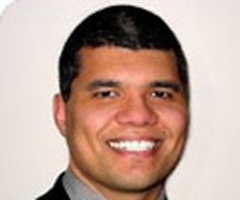
« Back to Schedule
Do not use the back button to return to the schedule, please use the link above
Martin Culpepper

Massachusetts Institute of Technology
The purpose of my research is to generate the knowledge required to create and integrate machine elements (flexures, mechanisms and actuators) to form small-scale, multi-axis nanopositioning systems (MNS). Nanopositioners are electromechanical systems wherein actuators, bearings and mechanisms are integrated in a way that enables them to position and orient components with nm-level accuracy. MNS are important as they set the limits on our ability to measure and control geometric relationships. They are relevant to (a) instruments that enable the measurement/understanding of small-scale geometries/phenomena and (b) equipment that enables the fabrication of parts that rely on small-scale geometries/phenomena. Advances in MNS technology makes it possible to increase the type/pace of scientific discoveries (via instruments) and improves the pace/quality with which these discoveries are put into practice (via equipment).
My research is focused upon the creation of MNS for nanomanufacturing equipment, instruments for nano-scale research and prototyping equipment for nano-scale research. Many emerging applications within these areas will require small-scale MNS – i.e. MNS that are nano-, micro-, or meso-scale in size – to achieve viable speed (kHz), resolution (nanometers), cost ($10s/device) and stability (Å/min) levels. These levels cannot be obtained with macro-scale MNS and it is impractical to obtain these levels by miniaturizing conventional macro-scale machine elements. New machine element concepts, synthesis methods and design tools are required to realize small-scale MNS. My research aims to create and grow a body of knowledge that supports the design and fabrication of small-scale MNS. Six-axis systems present the most challenging problems and therefore they serve as platforms for validating my research. Although this work is inspired by specific applications, the results are applicable to a wide array of small-scale MNS problems.


 Register now!
Register now!

